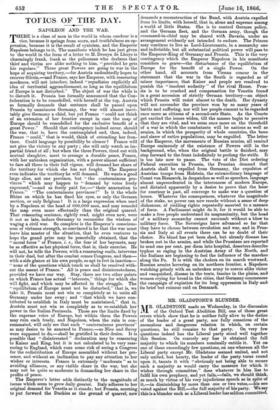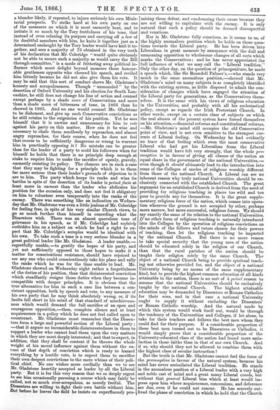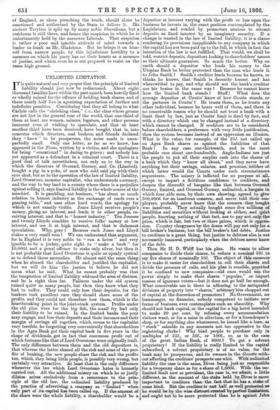MR. GLADSTONE'S BLUNDER.
UR. GLADSTONE made on Wednesday, in the discussion It I. of the Oxford Test Abolition Bill, one of those great errors which show that he is neither fully alive to the duties of the leader of a great party, nor fully conscious of the anomalous and dangerous relation in which, on certain questions, he still remains to that party. On very few questions indeed has the Liberal party stood well together this Session. On scarcely any has it obtained the full majority to which its numbers nominally entitle it. Yet on one of these exceedingly few questions, on one whereon all the Liberal party except Mr. Gladstone seemed united, and not only united, but hearty, the leader of the party turns round upon it, taunts it with "obviously not being able to secure such a majority as would carry the measure for which it wishes through committee," does whatever in him lies to fulfil his own prophecy, and yet fails,—fails, we should think, as much by virtue of his very injudicious speech as in spite of it,—in diminishing by more than one or two votes,—his son voted against the Bill,—the full majority of his party. We say this is a blunder such as a Liberal leader has seldom committed,
a blunder likely, if repeated, to injure seriously his own Minis- terial prospects. To strike hard at his own party on one of the measures on which it is most earnestly bent, and to irritate it so much by the Tory fretfulness of his tone, that instead of even relaxing its purpose and carrying off a few of its doubtful members with him, he knits it together just as a determined onslaught by the Tory leader would have knit it to- gether, and sees a majority of 73 obtained in the very teeth of his declaration that Mr. Coleridge "would quite obviously not be able to secure such a majority as would carry the Bill through committee," is a mode of frittering away political in- fluence which must delight beyond measure those honour- able gentlemen opposite who cheered his speech, and reviled him bitterly because he did not also give them his vote. It may be said that this sort of conduct shows Mr. Gladstone's honesty and scrupulousness. Though " unmuzzled " by the desertion of Oxford University and his election for South Lan- oashire, he still does not change his line of action and counsel except perhaps by a shade more of Conservatism and more Than a shade more of bitterness of tone, in 1866 than he showed in 1865. And no one would counsel Mr. Gladstone to be dishonest, and give up such Conservative convictions as lie still retains to the exigencies of his position. Yet he sees himself that it is unwise and unnecessary for him to vote against his party on this matter. How can it be wise and necessary to chafe them needlessly by reproaches, and almost angry reproaches, for their course, when he does not feel that course to be sufficiently dangerous or wrong to warrant him in practically opposing it ? No mistake can be greater than for the leader of a party to scold his followers when for himself he holds that there is no principle deep enough at stake to require him to make the sacrifice of openly, gravely, .earnestly resisting its policy. The chances are in such a case that they may be fighting for a principle which is to them far more serious than their leader's grounds of objection to it .are to him. The party which keeps its ranks and wins its battles in spite of the desertion of its leader is prirnd facie at least more in earnest than the leader who abdicates his position for the occasion only, and does not feel it obligatory on him to volunteer even temporarily into the ranks of the -.enemy. There was something like an indication on Wednes- day that Mr. Gladstone was even a little jealous of Mr. Coleridge for feeling free, in spite of his very similar Church views, to go so much further than himself in conceding what the Dissenters wish. There was an almost querulous tone of grievance in his speech, as if Mr. Coleridge had unfairly outbidden him on a subject on which he had a right to ex- pect that Mr. Coleridge's scruples would be identical with his own. To take such a tone is a very serious blunder in a great political leader like Mr. Gladstone. A leader unable,— regretfully unable,—to gratify the hopes of his party, and yet not sufficiently opposed to those hopes to make it a matter for conscientious resistance, should have rejoiced to see any one who could conscientiously take his place and rally the ranks which he was for the time unable to lead. Mr. Gladstone showed on Wednesday night rather a forgetfulness of the duties of his position, than that disinterested conviction which steadfastly resigns those duties when they become in- compatible with with deeper principles. It is obvious that the true alternative for him in such a case lies between a con- sistent opposition, both by speech and vote, to any measure of his own party that he may think absolutely wrong, or, if its faults fall short in his mind of that standard of mischievous- ness which would demand the full sacrifice of an open and courageous opposition,—then, complete silence and at least acquiescence in a policy which he does not feel called upon to counteract. Mr. Gladstone must remember that the Dissen- ters form a large and powerful section of the Liberal party ; —that it argues no inconsiderable disinterestedness in them to support a leader who cannot lead them upon the very matters in which they are most deeply interested; and that to expect, in addition, that they shall be content if he throws the whole weight of his moral influence against them without the ex- cuse of that depth of conviction which is ready to hazard everything by a hostile vote, is to expect them to sacrifice their own deepest convictions to the mere whims of their poli- tical chief. No one wishes more cordially than we to see Mr. Gladstone heartily accepted as leader by all the Liberal party. But it is for this very reason that we so deeply regret to see him occasionally pursuing a course which may fairly be .called, not so much over-scrupulous, as merely fretful. The Dissenters are willing to fight their own battle without him. lint before he leaves the field he insists on superfluously pro-
raising them defeat, and condemning their cause because they are not willing to capitulate with the enemy. It is only natural that such a policy should be deemed disrespectful and vexatious.
Nor is Mr. Gladstone fully conscious, as it seems to us, of the highly anomalous position which he holds on these ques- tions towards the Liberal party. He has been driven into Liberalism in great measure by annoyance with the dull and unmeaning opposition to wholesome changes of all sorts which marks the Conservatives ; and he has never appreciated the full influence of what we may call the "Liberal tradition." Only the other day, on the question of primogeniture, he made a speech which, like Sir Roundell Palmer's,—who stands very much in the same anomalous position,—showed that Mr. Gladstone's mind on many subjects is as completely identified with the existing system, as little disposed to admit the con- sideration of changes which have engaged the attention of the Liberal party for generations, as the Conservatives them- selves. It is the same with his views of religious education in the Universities, and probably with all his ecclesiastical policy, except as regards the Irish Protestant Church. In other words, except on a certain class of subjects on which the real abuses of the present system have forced themselves on his attention,—financial reforms and constitutional' reforms, —Mr. Gladstone's mind still occupies the old Conservative point of view, and is not even sensitive to the strongest cur- rents of Liberal feeling. On Wednesday he had evidently no trace of that feeling which even the most conservative Liberal who had got his Liberalism from the Liberal tradition would have felt very strongly, that the whole pre- sumption is in favour of giving all classes of the nation an equal share in the government of the national Universities,— even though it should ultimately lead to the introduction into some of the Colleges of modes of religious worship different from those of the national Church. A Liberal can see no inherent reason why truly national Universities should be ex- clusively connected with the established Church. The great argument for an established Church is derived from the need of providing for religious teaching in places too wild and too poor to provide any for themselves. It is the great supple- mentary religious force of the nation, which comes into opera- tion wherever the ground is not occupied by other, perhaps more narrow, but more successful, religious forces. We should say exactly the same of its relation to the national Universities. If no other form of religious teaching is naturally introduced into the Colleges by the operation of religious convictions on the minds of the fellows and tutors chosen for their powers of teaching, then let the religious teaching be imparted by the national Church. But there is no more reason to take special security that the young men of the nation should be educated solely in the religion of our Church, than that the =al parishes of the nation should be taught their religion solely by the same Church. The object of a national Church being to provide spiritual teach- ing not otherwise provided for, and the object of a national University being by no means of the same supplementary kind, but to provide the highest common education of all kinds attainable in the nation, there is no sort of a priori reason to assume that the national Universities should be exclusively taught by the national Church. The highest attainable education may be demanded by Dissenters or Roman Catholics for their sons, and in that case a national University ought to supply it without excluding the Dissenters or Roman Catholic worship. And the natural mode by which this system would work itself out, would be through the tendency of the Universities and Colleges, if let alone, to take for their teachers and fellows the best men whom they could find for their purpose. If a considerable proportion of these best men turned out to be Dissenters or Catholics, it would simply prove that a considerable proportion of the University-educated class of the nation had found more satis- faction in those faiths than in that of our own Church. And if so, why should they not be allowed to combine them with the highest class of secular instruction ?
But the truth is that Mr. Gladstone cannot feel the force of the presumption in favour of the natural system, because his mind has never assimilated the Liberal tradition. He stands in the anomalous position of a Liberal leader with a very high and noble cast of mind and a great many Liberal creeds, but without that general Liberal bias which at least would im- press upon him where acquiescence, concessions, and deference are due, even if he could not concur. He has scarcely out- lived the phaseof conviction in which he held that the Church of England, as alone preaching the truth, should alone be sanctioned and authorized by the State to deliver it. His ancient Toryism is split up by many noble liberaiisms, but a residuum is still there, and hence the suspicion in which he is unfortunately held by the narrower Liberals. That suspicion is rather a poor and ignoble attitude of mind towards a leader so frank as Mr. Gladstone. But he brings it on him- self from narrow people, by this injudicious hostility to a measure on which his party has set their hearts as a measure of justice, and which even he is not prepared to resist on the same high ground.
































 Previous page
Previous page